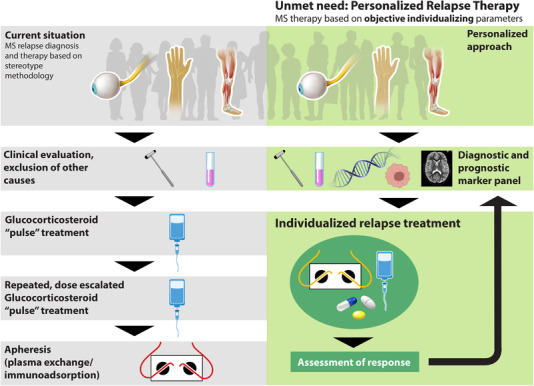Figure 1.

Unmet needs of personalized treatment approaches: MS relapse. (Left) MS standard treatment. With the occurrence of new or worsening symptoms of MS (e.g. visual, sensory, motor), further workup and therapy currently follow stereotypic flows and guidelines. Following neurological examination and exclusion of confounding factors (e.g. infections), high dose glucocorticosteroid “pulse therapy” is the current standard of care. If symptoms do not remit, a second, potentially dose‐escalated glucocorticosteroid pulse is administered. Apheresis techniques (plasma exchange/immunoadsorption) are employed in glucocorticosteroid‐resistant cases, not taking into account different sources of heterogeneity that lead to treatment nonresponse (“try and error”). (Right) MS personalized treatment. In a personalized approach, objective and prognostic markers on an individual level would be taken into account for a treatment decision. This marker profile would be informed by the mechanisms associated with heterogeneity in response to GC therapy as discussed in the text. Treatment could consist of different approaches (e.g. glucocorticosteroids, apheresis, new substances) also in combination. It is unclear, if treatment response in acute relapses varies over time, so marker profiles would potentially have to be individually updated to ensure response state during future relapses. Although some current findings will inform further research, at present no such marker profile exists.
